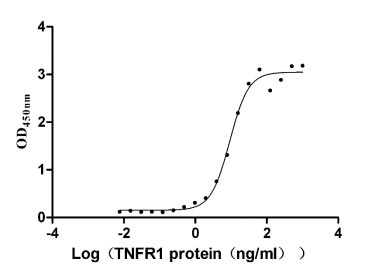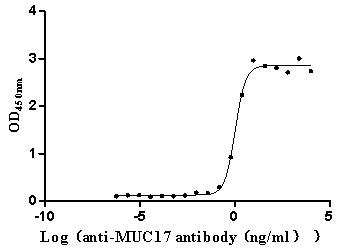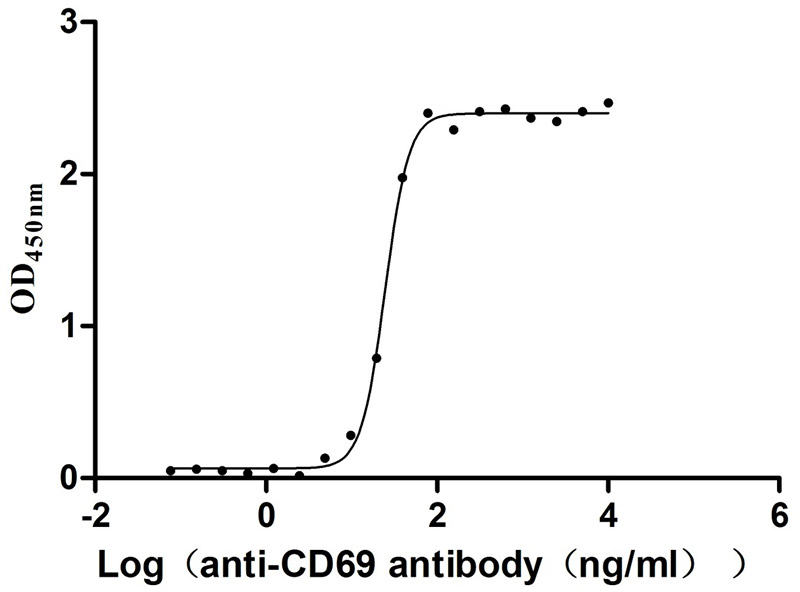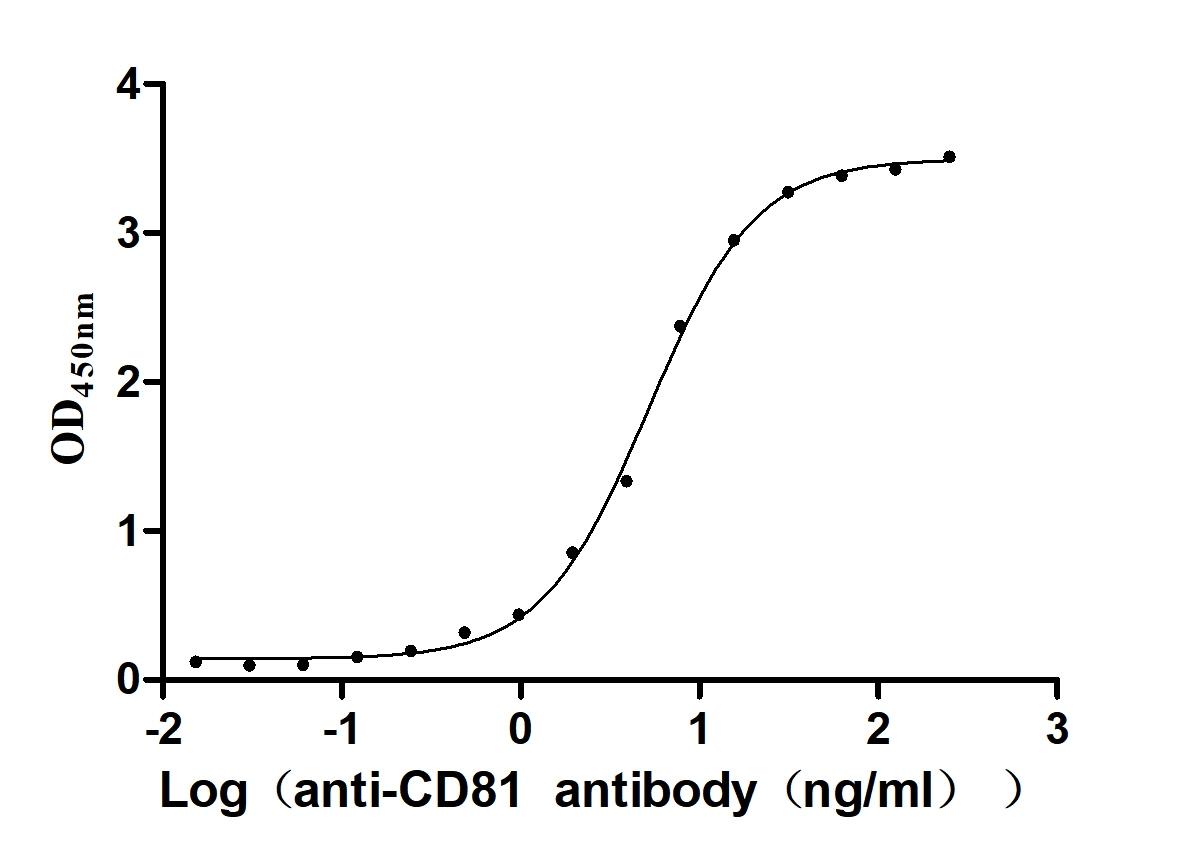Recombinant Rat Tyrosine-protein phosphatase non-receptor type 11 (Ptpn11)
-
中文名称:大鼠Ptpn11重组蛋白
-
货号:CSB-YP019025RA
-
规格:
-
来源:Yeast
-
其他:
-
中文名称:大鼠Ptpn11重组蛋白
-
货号:CSB-EP019025RA
-
规格:
-
来源:E.coli
-
其他:
-
中文名称:大鼠Ptpn11重组蛋白
-
货号:CSB-EP019025RA-B
-
规格:
-
来源:E.coli
-
共轭:Avi-tag Biotinylated
E. coli biotin ligase (BirA) is highly specific in covalently attaching biotin to the 15 amino acid AviTag peptide. This recombinant protein was biotinylated in vivo by AviTag-BirA technology, which method is BriA catalyzes amide linkage between the biotin and the specific lysine of the AviTag.
-
其他:
-
中文名称:大鼠Ptpn11重组蛋白
-
货号:CSB-BP019025RA
-
规格:
-
来源:Baculovirus
-
其他:
-
中文名称:大鼠Ptpn11重组蛋白
-
货号:CSB-MP019025RA
-
规格:
-
来源:Mammalian cell
-
其他:
产品详情
-
纯度:>85% (SDS-PAGE)
-
基因名:
-
Uniprot No.:
-
别名:Ptpn11; Tyrosine-protein phosphatase non-receptor type 11; EC 3.1.3.48; Protein-tyrosine phosphatase 1D; PTP-1D; Protein-tyrosine phosphatase SYP; SH-PTP2; SHP-2; Shp2
-
种属:Rattus norvegicus (Rat)
-
蛋白长度:Full Length of Mature Protein
-
表达区域:2-597
-
氨基酸序列TSRRWFHPN ITGVEAENLL LTRGVDGSFL ARPSKSNPGD FTLSVRRNGA VTHIKIQNTG DYYDLYGGEK FATLAELVQY YMEHHGQLKE KNGDVIELKY PLNCADPTSE RWFHGHLSGK EAEKLLTEKG KHGSFLVRES QSHPGDFVLS VRTGDDKGES NDSKSKVTHV MIRCQELKYD VGGGERFDSL TDLVEHYKKN PMVETLGTVL QLKQPLNTTR INAAEIESRV RELSKLAETT DKVKQGFWEE FETLQQQECK LLYSRKEGQR QENKNKNRYK NILPFDHTRV VLHDGDPNEP VSDYINANII MPEFETKCNN SKPKKSYIAT QGCLQNTVND FWRMVFQENS RVIVMTTKEV ERGKSKCVKY WPDECALKEY GVMRVRNVRE SAAHDYTLRE LKLSKVGQAL LQGNTERTVW QYHFRTWPDH GVPSDPGGVL DFLEEVHHKQ ESIVDAGPVV VHCSAGIGRT GTFIVIDILI DIIREKGVDC DIDVPKTIQM VRSQRSGMVQ TEAQYRFIYM AVQHYIETLQ RRIEEEQKSK RKGHEYTNIK YSLVDQTSGD QSPLPPCTPT PPCAEMREDS ARVYENVGLM QQQRSFR
-
蛋白标签:Tag type will be determined during the manufacturing process.
The tag type will be determined during production process. If you have specified tag type, please tell us and we will develop the specified tag preferentially. -
产品提供形式:Lyophilized powder
Note: We will preferentially ship the format that we have in stock, however, if you have any special requirement for the format, please remark your requirement when placing the order, we will prepare according to your demand. -
复溶:We recommend that this vial be briefly centrifuged prior to opening to bring the contents to the bottom. Please reconstitute protein in deionized sterile water to a concentration of 0.1-1.0 mg/mL.We recommend to add 5-50% of glycerol (final concentration) and aliquot for long-term storage at -20℃/-80℃. Our default final concentration of glycerol is 50%. Customers could use it as reference.
-
储存条件:Store at -20°C/-80°C upon receipt, aliquoting is necessary for mutiple use. Avoid repeated freeze-thaw cycles.
-
保质期:The shelf life is related to many factors, storage state, buffer ingredients, storage temperature and the stability of the protein itself.
Generally, the shelf life of liquid form is 6 months at -20°C/-80°C. The shelf life of lyophilized form is 12 months at -20°C/-80°C. -
货期:Delivery time may differ from different purchasing way or location, please kindly consult your local distributors for specific delivery time.Note: All of our proteins are default shipped with normal blue ice packs, if you request to ship with dry ice, please communicate with us in advance and extra fees will be charged.
-
注意事项:Repeated freezing and thawing is not recommended. Store working aliquots at 4°C for up to one week.
-
Datasheet :Please contact us to get it.
靶点详情
-
功能:Acts downstream of various receptor and cytoplasmic protein tyrosine kinases to participate in the signal transduction from the cell surface to the nucleus. Positively regulates MAPK signal transduction pathway. Dephosphorylates GAB1, ARHGAP35 and EGFR. Dephosphorylates ROCK2 at 'Tyr-722' resulting in stimulation of its RhoA binding activity. Dephosphorylates CDC73. Dephosphorylates SOX9 on tyrosine residues, leading to inactivate SOX9 and promote ossification.
-
基因功能参考文献:
- the effect of SHP-2 on the proliferation, cell cycle and apoptosis of renal tubular epithelial cells was investigated. PMID: 29991025
- Data demonstrate that the increased activation of MAPK signaling pathway by SHP2D61G could deregulate the surface expression of synaptic receptors during neuronal development. PMID: 28366775
- findings demonstrate that IL-17 regulates SHP-2 expression and IL-17RA/STAT-3 dependent production of Cyr61, IL-23, GM-CSF and RANKL in AA-FLS and may reveal a new insight into the pathogenesis of RA. PMID: 28898718
- Data suggest that phosphorylation of Shp2/Ptpn11 at Tyr542 and its translocation to postsynaptic compartment are integral processes in synaptic scaling/homeostasis; Shp2 phosphatase activity is critical to regulation of Ser(P)845 GluA1 and surface expression of GluA1 during synaptic scaling. (Shp2/Ptpn11 = protein tyrosine phosphatase non-receptor type 11; GluA1 = glutamate receptor ionotropic Ampa1 [alpha 1]) PMID: 28768764
- results have revealed a regulatory mechanism of Shp2 underlying LTP and memory, broadening our understanding of Shp2 in cognitive function. PMID: 27417137
- PKA phosphorylation of Shp2 protein inhibits its phosphatase activity and modulates ligand specificity PMID: 25802336
- Data indicate that protein tyrosine phosphatases SHP-1, SHP-2 and PTP1B overexpressed during the development of cerulein -induced acute pancreatitis can be modulated by extracellular signal-regulated kinases (ERK1/2) and c-Jun NH2-terminal kinase (JNK). PMID: 24225419
- our data show that in hemiparkinsonian rats developing dyskinesia, the aberrant phosphorylation of Shp-2 by D1R activation, represents an upstream molecular event leading to the persistent phosphorylation of Erk1/2 PMID: 23328768
- key regulator of blood-testis barrier integrity and Sertoli cell support of spermatogenesis and fertility PMID: 23325809
- Data indicate that the two LEOPARD syndrome mutations Q510E-Shp2 and Y279C-Shp2 both induce neonatal cardiomyocytes hypertrophy through similar mechanisms. PMID: 23673659
- changes in mitochondria-localized signaling molecules Src and SHP2 constitute a potential signaling pathway to affect mitochondrial dysfunction in the heart during sepsis PMID: 22952679
- These results indicate that SHP2 is recruited in focal adhesions of neural stem cells and regulates focal adhesion formation PMID: 22118986
- The results have revealed that Shp2 functions as an intracellular inhibitor of apoptosis. These data provide insight into the pathogenesis of heart diseases. PMID: 22537548
- the involvement of SHP2 activity in the regulation of the expression of the fatty acid-metabolizing enzyme ACSL4 PMID: 21903867
- SHP-2 promotes oligodendrocytes maturation via Akt and ERK1/2 signaling in vitro. PMID: 21701583
- SPRED1 is a likely substrate of SHP2, whose tyrosine dephosphorylation is required to attenuate the inhibitory action of SPRED1 in the Ras/ERK pathway. PMID: 21531714
- SHP2 supports basal pulmonary endothelial barrier function by coordinating the tyrosine phosphorylation profile of VE-cadherin, beta-catenin, and p190RhoGAP and the activity of RhoA. PMID: 20023173
- SHP-2 has a role as a positive regulator of cytokine receptor signaling by regulating ubiquitination/degradation pathways PMID: 14522994
- Shp-1 and Shp-2 are recruited on cell membrane in two distinct molecular complexes including Ret oncogenes PMID: 15115663
- first tyrosine phosphatase shown to be present in mitochondria PMID: 15378208
- These results demonstrate a unique role for SHP-2 in the regulation of the cellular architecture of vascular smooth muscle cells, suggesting the possibility that this phosphatase might be instrumental in vascular remodeling. PMID: 16021628
- ROS-mediated oxidation of SHP-2 is essential for HB-EGF-mediated EGFR transactivation in ET-1 signaling pathway in NRK-52E cells. PMID: 16261333
- studies demonstrate that SHP-1 & SHP-2 are expressed in myometrium & appear to be responsible for tyrosine phosphatase activity in this tissue, providing a molecular mechanism for modulation of phospholipase C-gamma1 phosphotyrosine levels in the uterus PMID: 16814162
- Tyr-542 of SHP-2 modulates IL-1-induced Ca2+ signals and association of the ER with focal adhesions PMID: 16905534
- Shp2 participates to the opposite effects induced in PC12 cells by EGF and NGF and that the interactions with the multidocking Gab2 protein mediate such effects. PMID: 17287109
- Our results show that AP is associated with increases in the expression of SHP-1 and SHP-2 and changes in the dynamics of SHP-2 subcellular distribution in the early phase of Cer-induced AP. PMID: 18294464
- Findings do not support an essential role of SHP2 in the pathogenesis of experimental pneumoniae meningitis, but it is possible that SHP2 protein expression may be used as a marker of disease activity. PMID: 18305318
- SHP-2 dysregulation by increased Nox1-derived ROS in spontaneously hypertensive rats is associated with altered Ang II-AKT signaling. PMID: 18566342
- Localization of PTP-1B, SHP-2, and Src exclusively in rat brain mitochondria and functional consequences.( PMID: 18583343
- Results indicate that a presynaptic signaling pathway through p120ctn, Fer, SHP-2, and beta-catenin promotes excitatory synapse development and function. PMID: 19047464
- ROS-mediated oxidation of SHP-2 is essential for the hUII-induced mitogenic pathway in NRK-52E cells. PMID: 19326266
- The SHP-2 is activated by ROS-mediated oxidative stress in astrocytes and functions as a component of the raft-mediated signaling pathway that acts through dephosphorylation and inactivation of other phosphotyrosine proteins, such as STAT-3. PMID: 19348936
- Report role for Gab1/SHP2 in thrombin activation of PAK1: gene transfer of kinase-dead PAK1 inhibits injury-induced restenosis. PMID: 19359598
- SHP-2 associated with Gab2 in rat basophilic leukemia cells; its association with Gab2 is enhanced following multimerization of FcERI and/or depolymerization of the filamentous actin. PMID: 15162432
显示更多
收起更多
-
亚细胞定位:Cytoplasm.
-
蛋白家族:Protein-tyrosine phosphatase family, Non-receptor class 2 subfamily
-
组织特异性:Expressed in brain, muscle and lung.
-
数据库链接:
KEGG: rno:25622
STRING: 10116.ENSRNOP00000041842
UniGene: Rn.98209
Most popular with customers
-
Recombinant Human Tumor necrosis factor receptor superfamily member 1A (TNFRSF1A), partial (Active)
Express system: Mammalian cell
Species: Homo sapiens (Human)
-
Recombinant Human Poliovirus receptor (PVR) (I340M), partial (Active)
Express system: Mammalian cell
Species: Homo sapiens (Human)
-
Recombinant Human Mucin-17 (MUC17), partial (Active)
Express system: Mammalian cell
Species: Homo sapiens (Human)
-
Recombinant Human Early activation antigen CD69 (CD69), partial (Active)
Express system: Mammalian cell
Species: Homo sapiens (Human)
-
Recombinant Human CD81 antigen (CD81), partial (Active)
Express system: Mammalian cell
Species: Homo sapiens (Human)
-
Recombinant Human Interleukin-2 (IL2) (Active)
Express system: Mammalian cell
Species: Homo sapiens (Human)



-AC1.jpg)














